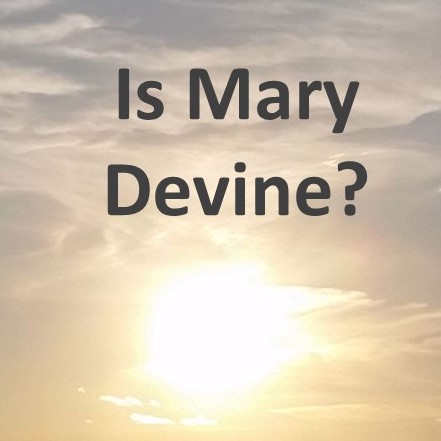Q&A: I was shocked to read that in Fr. de Montfort’s True Devotion that Mary is called divine. Mary, divine? Isn’t that plain and simple blasphemy?
( The gist of a question we have received several times.)
Father J. Patrick Gaffney, SMM
A Blasphemy? Definitely, if the expression in any way even implies that the “nothing” who is Mary is God. Saint Louis de Montfort would, I am sure, become enraged if anyone suggested that this creature is the Creator or that this finite, human person is an infinite Divine Person. “I avow with all the Church that Mary, being nothing more than a creature that has come from the hands of the Most High, is in comparison with His Infinite Majesty less than an atom, or rather, she is nothing at all because only He is ‘He Who is’ ” (TD 14). And even more strongly, he asserts: “She (Mary) is the mistress of the Divine Wisdom (Jesus Christ), not that she is above the Divine Wisdom, true God, or that she is His equal: it would be blasphemy to think that or to say tha ” (LEW 205). The absolute centrality of Jesus Christ, the adoration of God Alone, is embedded in Montfort’s writings. He is too clear on this point to quibble about it.
And it had well better be! Otherwise we would be citing the texts of a pagan or more precisely of an out-and-out blasphemer. The first commandment is clear: “I am the Lord your God . . . you shall have no other gods to set against me” (DT 5:6).
Yet at first glance, there appears to be a problem in Montfort’s writings precisely concerning this first commandment. Even though his motto is the emphatic GOD ALONE! Even though he insists that Our Lady is clearly a creature never to be adored, thirty—one times he calls her “the divine Mary.” And it is only the Mother of God who is divine! He terms a letter divine for it tells of the Cross (L 13); he speaks of the divine and adorable cross since it has been purpled by the divine Blood of the Lamb (L 34). Adam before the fall is called divine, so intimately does he live God’s life (LEW 38). A few other examples: divine theology for it is a study about Christ crucified (FC 26); suffering divinely for it is done for the sake of Jesus (FC 52); the Hail Mary is the divine salutation for it comes from God (SR 52); man in the state of grace is a man—God, for he shares in the divine nature (SM 17), etc., etc.
We can well understand Saint Louis Marie’s stress on the “divine Heart of Jesus,” the “divine eye of God,” “divine Providence,” “divine mercy,” “divine love,” etc., since the adjective “divine is being predicated of the incarnate Second Person of the Trinity, Jesus, or of the Godhead. But how can he be so lavish is applying this term to other persons and things which clearly are not God?
For many English readers who have studied God Alone: The Collected Works Of Saint Louis de Montfort, the expression “the divine Mary” etc., is never encountered. The first translation of the flue Devotion, clone by the Oratorian, Father Faber, retains the “divine’s.” However, some subsequent translators considered this such a stumbling-block that it is omitted or other words like “godlike,” “holy” are used as substitutes. The publishers felt that this would obviate any mistaken understanding that Saint Louis de Montfort actually taught that God is not the only one who is divine. Yet the French originals of his writings clearly use the word “divine.” Why?
First, the custom of the times. No Frenchman of the baroque age of Louis XIV would have any difficulty with Montfort’s usage. “Divine” is applied to Mary by St. John Eudes and other members of the French School of spirituality (“the divine Virgin”). Moreover, it is profusely used by one of Saint Louis de Montfort’s favorite authors, Boudon. Not only does he frequently call Mary “divine” but he also speaks of the “adorable crucifix,” “the divine heart of the most chaste Virgin,” “divine truths,” “the divine Saint Paul,” “the divine Office,” etc.
A writer during the baroque age, Saint Louis de Montfort shows that he is a man of his times. In fact, he a far less flowery than some of his contemporaries. However, it is not only ornate language that prompts Father de Montfort to apply the term “divine” to Our Lady. No mere creature so intensely participates in divine life through Jesus in the power of the Holy Spirit than this woman of Nazareth. The Immaculate Conception by a unique grace of God, Mary is also the Mother of God the Word enfleshed, Jesus Christ. As mother, she and her divine Son are united by a unique and everlasting relationship of knowledge and love. She, in such a special way, is the daughter of God the Father, Mother of God the Son and Spouse of the Holy Spirit. If any human person may be called “divine,” it is Mary.
Even though it is not customary today to use the adjective “divine” for Mary, isn’t is strange that we still call an opera star a “diva”? And isn’t it “Saint John the Divine”? And how about that rather fawning expression, “Darling, your outfit is absolutely divine’”



